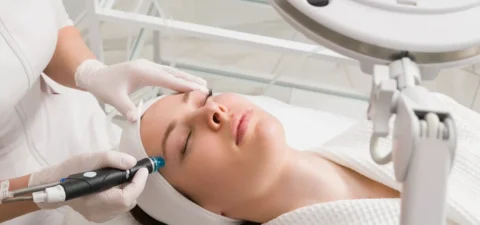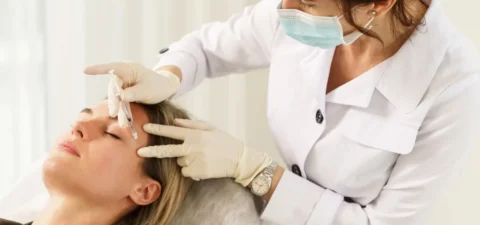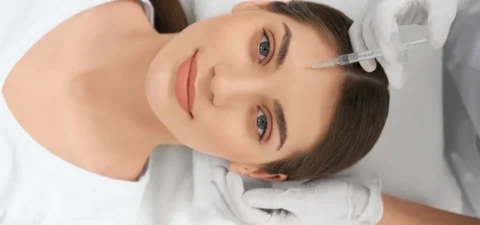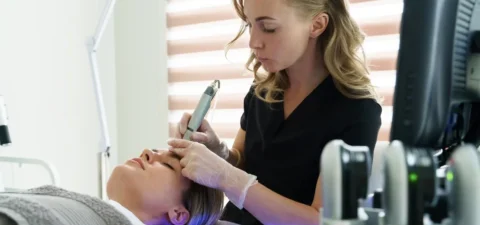For information only. Not meant as advice in any form. Please consult your medical professional or lawyer.
Being a master esthetician is a fulfilling job that allows you to closely work with clients, treat their skin conditions, and improve their confidence. If you’re planning to pursue a career in esthetics, then it’s worth knowing what the job entails and what you need to do to make it happen.
So what are a licensed esthetician’s job description and requirements? Licensed estheticians need to obtain a license first before they can perform skin treatments like waxing and facials in a salon or spa. But to do this, an aspiring esthetician needs to attend an esthetician school, complete the required training hours, pass all the exams, and finish their apprenticeship.
Why License Matters to Estheticians
According to the Associated Skin Care Professionals (ASCP), there are about 183,000 licensed estheticians in the country working in different salons, spas, clinics, hospitals, and other establishments. This number might increase in the following years to cope with the growing demand for beauty and skin care treatments.
Estheticians come in many different types like medical estheticians, makeup artists, skincare specialists, and more. But before venturing into these specializations, it’s important to attend an esthetician program and pass a licensing exam first.
Licenses are extremely important to estheticians because it shows that they’re qualified to safely perform each treatment on the patient. Having an esthetician or cosmetology license also adds to the legitimacy of the practice and the industry in general.
License vs. Certification
“License” and “certificate” are 2 things that many people mistakenly interchange, but they’re actually not the same thing in the field of cosmetology and esthetics. In most states, licensure is needed for estheticians to work and provide treatments for their clients.
On the other hand, a certification is a kind of continuing education that’s taken voluntarily. A certificate isn’t something that employers require from aspiring estheticians, but having one for specific skin treatments increases their chances of getting hired.
Certificates from a beauty school mean that the esthetician received the proper training to perform the treatment. It also shows their dedication and passion for the beauty industry because they strive to learn more even after getting their esthetician license.
Esthetician License Requirements
The requirements for anyone who wants to attend esthetician schools vary per state, but most of them require participants to be at least 16 years old with a high school diploma or GED certificate. After completing the cosmetology or esthetician training program, they need to prepare for getting a licensure exam.
But aside from these documents, applicants should also have the right personality, attitude, and mindset as they start a career in the beauty industry. Here are some of the most important skills that aspiring estheticians should have:
- Aptitude for working in sales
- Genuine interest in skincare and beauty products, as well as consumer information
- Capability to interact with clients, assess their condition, and meet their needs
- Being comfortable working with clients closely
- Awareness about the benefits and disadvantages of certain skincare products and their ingredients
- Ability to clearly communicate with patients and explain everything they need to know
- Compassion and sensitivity to patients and their health concerns or issues
How to Get Your License
Although anyone can be an esthetician, the road to getting there isn’t an easy one. Before applying for a licensure exam, applicants must finish an accredited training program, complete the required training hours, pass the required examination, and finish their apprenticeship.
1) Attending Esthetician School
The first step to becoming a licensed esthetician is enrolling in an esthetics or cosmetology program. Many institutions offer these kinds of training courses, making it difficult to find the best one that suits an applicant’s goals and needs.
Each curriculum for esthetician training varies per school and location, but the lessons included in the program should prepare the applicant for the licensure examination and the state’s training hour requirements. Another accreditation to consider is the one awarded to recognized institutions by the National Accrediting Commission of Career Arts and Sciences (NACCAS).
2) Finishing the Required Training Hours
Training hours refer to the time that aspiring estheticians spend during their training to become an esthetician in a cosmetology program. Your training hours are a combination of hands-on training and academic coursework, which all prepare you to meet the state’s licensure requirements and allow you to perform each treatment safely and competently.
The number of training hours required for estheticians also vary per state. For example, estheticians in Oregon only require at least 250 training hours while the state of Georgia won’t grant an esthetician license to anyone who hasn’t reached 1,000 training hours. Most states require at least 600 hours of training, but estheticians should still check their state requirements to avoid mistakes.
3) Taking the Required Exams
For most estheticians, the final hurdle they face before becoming a licensed esthetician is passing the National Interstate Council of State Boards of Cosmetology (NIC) exam. It’s composed of 2 parts: the practical exam and the theory exam.
Most states require estheticians to complete and pass both parts. But if the state you’re in doesn’t require NIC testing, then they’re most likely administering a similar test.
4) Doing Apprenticeships
Some states offer to decrease the required number of training hours for students who are in apprenticeship programs. Serving as an apprentice to other estheticians, plastic surgeons, or dermatologists is extremely beneficial because it allows students to learn about real-life settings and actual clients.
Maintaining Your License
Even after obtaining your esthetician license, there’s still the matter of maintaining and renewing it every few years. Different states also have a specific set of rules regarding esthetics license renewal – it can be every year or every other year. Some states like Indiana only require renewal every 4 years while other places like Kansas only require instructors to renew their license.
Some states even include extra training hours in their license renewal requirement, which means estheticians should attend continuing education programs. Renewal applicants are also required to pay a charge fee, which varies depending on where the applicant works or lives.
Duties and Job Descriptions for Licensed Estheticians
Before applying for an esthetician license, it’s also crucial for applicants to fully understand the career path they’re trying to take. Aside from the requirements needed for the licensure, you should also know about the duties and job descriptions for estheticians.
What They Do
An esthetician is a skincare specialist found in salons and spas that provide waxing treatments, facials, exfoliating treatments, pore cleansing, and more. Some of them can also work in resorts or medical settings as long as they have adequate training to offer services and treatments to their clients.
Here are some of the most common types of services that estheticians may offer:
1) Makeup Artistry
Proper makeup application techniques are part of an esthetician’s job description. They educate clients about makeup, like how to choose the best shade for their skin tone and which products accentuate their bone structures. An esthetician may also become a beauty brand representative and recommend skin care products to their customers.
2) Medical Spa Services
Medical spas are a hybrid of traditional day spas and medical clinics. They have the appearance of a traditional spa, but their staff is usually composed of licensed medical doctors or nurse estheticians that operate based on their specialty. Medical estheticians may also work in medical spas and provide more complicated treatments like laser hair removal, vein therapy, chemical peels, microdermabrasion, and more.
3) Dermatology
Another job opportunity for licensed medical estheticians is working in plastic surgery or dermatology clinics to assist in procedures and help patients with their recovery after a surgical skin treatment. A medical esthetician helps the client with their pre- and post-operative skincare regimen.
What They Can’t Do
Although working as an esthetician has its perks, there are also limitations to this kind of career. For one, estheticians can’t perform a Botox treatment because it’s considered a medical procedure instead of a cosmetic one. They also can’t operate a medical spa alone, so they need to partner with an MSO, a physician, or a physician-owned company to be a co-owner of a med spa.
Expected Salary
Esthetician salary rates also vary per state and experience. The national average salary of a licensed esthetician in the US is around $38,324 per year. The state with the highest average salary is New York at $45,484 per year or $21.87 per hour. Estheticians who manage their own practice usually earn higher salary rates, given that they have a loyal customer base and a good reputation in their area.
Learn More About Cosmetic Treatments With FACE Med Store
Being a cosmetologist or esthetician requires you to keep up with the latest trends in the beauty industry to provide the best treatments for your patients. At FACE Med Store, we offer a wide selection of different online training courses to help expand your skill set and provide better services to your clients.
We’re also a trusted partner of hundreds of medical spas and healthcare institutions across the country when it comes to high-quality medical tools and equipment. Reach out to us today using our contact information to know more about our services or products.






